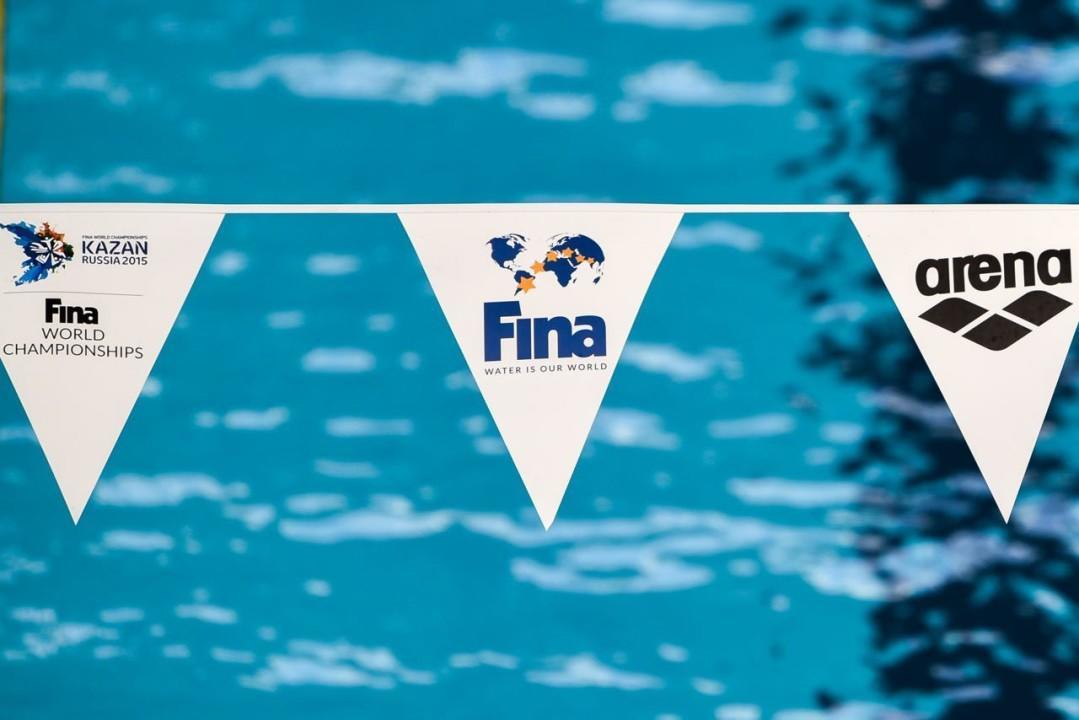FINA, the world governing body of aquatic sports and swimming, has come under fire in recent years, with some in the swimming community calling for the organization’s replacement. FINA, which has close ties with the International Olympic Committee (IOC) and the World Anti-Doping Agency (WADA), is responsible in whole or in part for the supervision of major international swimming and aquatics competitions.
FINA’s influence and authority is omnipotent in swimming. When FINA passes a new rule or regulation, it must also be adopted by all the National Governing Bodies (think USA Swimming) around the world and implemented throughout all levels of competition. ‘FINA Approved’ stamps on suits and other competitive gear show that a brand is abiding by the strictures passed by FINA in 2009 during the ‘tech suit era’ when world records were broken in staggering numbers (43 at the World Championships in Rome) as the ultra-buoyant polyurethane suits gave some body types an advantage over others. Though controversial at first, nearly all swimmers and coaches throughout every level of swimming have come to embrace this ruling and consider it a positive reformation for the sport. Though like any large international organization, FINA has had other controversies that it seems unable to shake, and has garnered many critics.
While most athletes have been hesitant to voice their opinions about FINA (check Michael Phelps at 16:24 in the 100 fly press conference in Rio), five-time Trinidadian Olympian George Bovell has been very vocal about his disapproval of FINA. FINA’s president, Julio Maglione, sparked controversy earlier this year when he said WADA’s McLaren Report, which revealed a state-sponsored doping scheme in Russian sports, “lacked credibility,” and that WADA exceeded its powers by calling for a ban on all Russian athletes at the 2016 Olympic Games. FINA also came under fire in 2014 when it awarded Russian president Vladimir Putin the ‘FINA Order,’ the highest honor that FINA can give an individual.
For those critical of FINA, a group of individuals known as the World Swimming Association (WSA) have come together to create a viable alternative, and recently published a constitution detailing its purposes and procedures. The WSA has been organized by the World Swimming Coaches Association Board of Directors, which includes legendary American coach Bob Bowman, among others from Australia, Great Britain, Canada, and Namibia. Adoption of the WSA would signify structural changes and a change in geography, as the WSA is based out of Fort Lauderdale, Florida–though there is also an Australian office–while FINA is headquartered in Lausanne, Switzerland.
The basic structure and rules of the WSA are as follows:
Structure of members and governance
• WSA Board of Directors
• Membership (categories to be defined)
• Committees, as needed
• Competing Nations
• Competing Athletes
• World Open Water Swimming Association (WOWSA)
Composition of WSA Board of Directors
• World Swimming Coaches Association (WSCA) – 2 Board members elected from the Top 15 swimming nations.
• WSCA – 1 Board member elected from below the Top 15 swimming nations.
• Professional Swimmers Association (PSA) – 3 Board members elected from the World Top 16.
• WOWSA – 1 member elected by the WOWSA board.
Geographical Representation: “All selection criteria is based upon a country’s finish at the Olympic Games or the WSA Championships.”
Executive Committee
“The Executive Committee will be elected by the 7-member Board and will include President, Vice President, Secretary, Treasurer, and the Immediate Past President will serve without vote (ex officio).”
“At least one member shall be a coach and at least one member shall be an athlete.”
Members shall be terminated if the following violations occur:
- Cheating
- Dishonesty
- Fraud
- Voluntary Withdrawal, and
- A doping conviction
Members may be sanctioned for the following violations:
- Cheating
- Dishonesty, and
- Fraud
The varying degrees of sanctions will include:
- Warning;
- Fine;
- Suspension; and
- Expulsion; and
- Denial of participation in event;
“All sanctions are available to the Board, and may or may not be used in order.”
Some of the topics to be presided over by committees within the WSA will include: Finance, Audit, Marketing, Anti-Doping, Officials, Learn-to-Swim, Growth, Coach Development, Athlete Development, Facility Development, Elite Performance, Health & Safety, Administration & Management.
The full constitution of the WSA can be found here. Perhaps the most interesting piece of information given in the summary above is the mention of a WSA Championships. While there is no set date or location for an Inaugural WSA World Championships, should such an event come to pass, global participation and recognition from other organizations such as the IOC and WADA would signal whether or not future success and world-wide adoption of the WSA is possible. Unlike FINA, the WSA only focuses on swimming (pool and open water) and has not indicated whether or not it would grow to also represent diving, synchronized swimming, and water polo, all of which are governed by FINA internationally.

Jump ship to a greedy sinking ship? How much are yall going to pay each other on this shady movement? Any more studies using member registration dues to disprove things that do work and athletes love…transparency doubtful. No thanks.
I think you may be surprised how many will jump ship and attend a championship and organization run for the sport and by the sport
It’s about time
Do it.